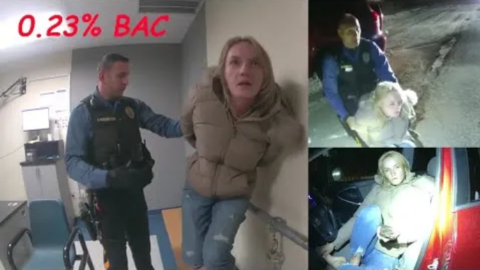Janice Fiamengo suggests that demands to the use of police bodycam footage involving young women being arrested for criminal behaviour is a weird bit of official white-knighting on the part of the authorities:
Moments of public outrage can be opportunities to consider deep-rooted cultural assumptions.
There’s been moral outrage lately over a popular YouTube channel called Drive Thru Tours. Launched in 2020, the channel started out by posting videos of tours through parts of New Jersey and New York. It hit paydirt last year when it began showing videos of police arrests, with titles such as “Rude 19-year-old Girl Arrested for DUI in Pullman, WA” (recommended if you want to get a flavor of the site) and “Belligerent Woman Arrested for DWI after Police Pursuit and Taken to Jail” (not recommended — very disturbing). The channel owner obtained the content — which until recently has focused exclusively on female offenders — from police bodycam recordings, now publicly available through freedom of information requests.
Bodycam footage was originally made accessible to the public so that American citizens can hold police accountable for their actions. Scrutiny of police behavior is widely considered a public good. Scrutiny of female behavior, however, is quite a different story — as responses to the channel demonstrate.
According to a small flurry of recent news reports, New Jersey police are warning that Drive Thru Tours is harming “vulnerable” young women by posting the evidence of their arrests. The bodycam footage was never intended, they protest, for such a purpose. In consequence, the Association of Chiefs of Police of New Jersey is calling for legislation against what they are describing as “online sexual predators“, and lawmakers in that state are considering a bill that would prohibit publishing the footage except within narrow parameters, including with the written consent of the subject.
Quite apart from whether such a bill is a good idea or not (I favor public access but have not given the matter serious thought), the language used in the articles is remarkable for its gynocentric sentimentality and misplaced sympathy.
One of the most vocal on the subject is Montville, New Jersey Police Chief Andrew Caggiano, who is quoted as stating that “It was never the intent of OPRA [the Open Public Records Act] to create such a platform that preys on young women and takes advantage of them at a time when they are vulnerable”. He also expressed a personal repugnance: “As a law enforcement professional and the father of three daughters, I am sickened by the fact that people are abusing OPRA to post these types of videos on social media sites”.
Given that it is not (yet) illegal to use bodycam material in the manner described, Chief Caggiano’s dramatic reaction seems overstated. One wonders in what sense the reckless and self-absorbed young people shown in these videos are “vulnerable”. Wouldn’t such language be better suited to their victims? Perhaps Caggiano knows something about his daughters that we don’t know (there is a video in which a “Cop’s Daughter Gets Arrested for DWI after Fleeing Accident Scene”): one would not normally expect a chief of police to so quickly substitute in imagination his own daughters for the inebriated and flagrantly dishonest women shown on Drive Thru Tours.
Caggiano’s bluster is, of course, all too familiar in a culture that cannot bear to hold women fully responsible for their bad actions — no matter how anti-social or potentially lethal — and must habitually frame them as innocent victims. It’s impossible to imagine such outraged sympathy being expressed for any male offenders in similar situations.




